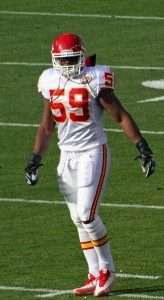My parents were married in Minnesota, a state where long cold winters bring ice to the lakes and ponds and the fast-paced sport of hockey is popular.
Shortly after my folks were married, a neighbor approached my mother.
“Is everything all right with you and John?”, she asked my mother Ann.
“Yes. Why?”, my mother replied, puzzled.
“Well, I hear him yelling.” The neighhbor looked concerned.
My mother replied, “Ohhhhhhhh. No. He’s yelling at the hockey games!”

The Minnesota Wild hockey team. It wasn’t around when my parents got married, but I’m sure hockey looks the same now as it did in the 1970s.
My father John likes most sports–including hockey. I have fond memories of watching Sunday televised football games and going to the San Francisco 49ers training camp to watch players get ready for a season sometime back in the 1980s.
I like sports, although I’ve only been super excited during playoffs involving the professional basketball team in my former city and the basketball team at my favorite university. I do have a favorite baseball team and soccer team.
When I was a graduate student, I took a class in which I was assigned to argue sports have a negative, violent influence on society.
It was easy to find examples.
Mike Tyson bit Evander Holyfield’s ear during a boxing match. Rae Carruth of the Carolina Panthers was convicted for his role in killing his pregnant girlfriend Cherica Adams. Investigators found the body of university basketball player Patrick Dennehy in a Texas rock quarry. His teammate Carlton Dotson was arrested for the murder. And, more recently, Jovan Belcher of the Kansas City
Chiefs shot and killed his girlfriend then drove to the team’s practice facility and committed suicide.
I told one of the sports television anchors I worked with back then that I was debating sports as a negative influence in society. She immediately said, “I can’t believe what these athletes do. And they’re supposed to be role models.”
Coaches psych teams with demands they make the opposition hurt and suffer. The pledge is to teach athletes to fight, inflict pain on others, endure pain stoically themselves, and win, win, win! According to David Rowe in “Sport, Culture and the Media,” athletes are weapons. Competitive sports are the embodiment of war. A successful athlete demonstrates the greatest strength and skills vital in fighting, pursuing, and escaping.
When athletes are arrested for murder, the public says, “oh, athletes are just violent people.” The fans don’t recognize it’s not the people. It’s the culture.
That was my argument. How did I do?


Viewing professional athletes as role models is ridiculous. Those who changed the world should be role models, like Einstein, Tesla, Ford, Edison, Lincoln, etc. Society shall suffer so long as we look up to questionable sources of encouragement. My roll model as a young man? Well, my father, of course. Maybe we can’t change who our role models were as children, but we can certainly chose to be role models for ours.